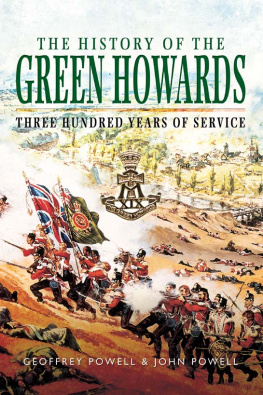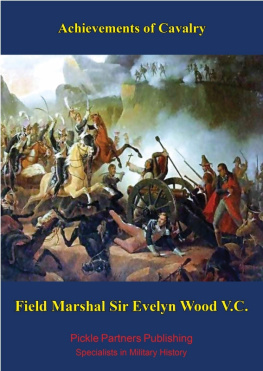First published in 1990 by Leo Cooper
Published in 2004, in this format, by
PEN & SWORD MILITARY CLASSICS
an imprint of
Pen & Sword Books Limited
47 Church Street
Barnsley
S. Yorkshire
S70 2AS
Geoffrey Powell, 1990, 2004
ISBN I 84415 039 9
A CIP record for this book is
available from the British Library
Printed in England
by CPI UK
Contents
Illustrations
Maps
PLUMER FAMILY TREE
GLOSSARY
ADC Aide-de-Camp
ANZAC Australian and New Zealand Army Corps
BGGS Brigadier General General Staff
BEF British Expeditionary Force
BL British Library
C-in-C Commander-in-Chief
CEF Canadian Expeditionary Force
CGS Chief of the General Staff
CIGS Chief of the Imperial General Staff
CO Commanding Officer
CRA Commander of the Royal Artillery.
DAN Dtachement dArme du Nord
DMO Director of Military Operations
DSO Distinguished Service Order
GAN Group of Armies of the North
GCB Knight Grand Cross of the Order of the Bath
GHQ General Headquarters
GOC General Officer Commanding
GSO1 General Staff Officer Grade 1
GS02 General Staff Officer Grade 2
IWM Imperial War Museum
KCB Knight Commander of the Bath
MC Military Cross
MGGS Major-General General Staff
MM Military Medal
MRF Matabeleland Relief Force
NAM National Army Museum
NCO Non-Commissioned Officer
NLS National Library of Scotland
OH Official History
PRO Public Record Office
psc Passed Staff College
RA Royal Artillery
RE Royal Engineers
RFC Royal Flying Corps
RUSI Royal United Services Institute for Defence Studies
VC Victoria Cross
WO War Office
The First World War cast a deep and ineradicable shadow over those of us who grew up in its aftermath. Memories were vivid. My father was twice in action with infantry battalions on the Western Front, first on the Somme in 1916 and then in Flanders 1918. Each time he was wounded within three weeks of arriving. Of his four brothers, the one nearest to him was killed and two others were badly wounded. During long walks over the moors of North Yorkshire, this temporary soldier would enthral his young son with tales of life in the trenches and his views about the war. An avid admirer of writers such as C.E. Montague, Edmund Blunden and Siegfried Sassoon, to whose works he introduced me, he had little respect for the British generals who he blamed for the slaughter among his generation. He admitted only two exceptions. These were Monash, the Australian, and Plumer Old Plum and Apple, as the troops were said to call him.
Some sixty years later, the son set out to discover what was so very special about this General Plumer Field-Marshal the Viscount Plumer of Messines as he became. From his portraits and photographs he looked rather vacuous. Could he even have been the original for Lows pungent cartoons of Colonel Blimp?
Very soon it became apparent that a mans appearance can seldom have so belied his character. Here was someone both able and loveable, and perhaps too quickly I fell under the spell of his attractive personality, that occupational hazard of biographers. Perhaps I have erred; only my readers can judge. Certainly the only previous biography of Herbert Plumer suffered from this defect in an exaggerated form, that written by General Tim Harington, his close friend and his Chief-of-Staff during his most critical battles.
I quickly discovered why General Sir Charles Haringtons book had not been followed by others. There were few sources for Plumers career readily available. As Miss Rose Coombs, that omniscient authority on the Western Front, discovered, what papers Plumer had kept were destroyed under his instructions before his death by Sergeant Back, his wartime clerk and postwar personal factotum. According to Back, his General had done so to prevent scurrilous stories being written about him and his friends. To match this loss, Haringtons own papers have also disappeared, including the copies of the letters from Plumer to his wife which provided much of the framework for his book. Just a few family albums of photographs and other papers have survived; these were compiled by his wife and his eldest daughter, the Hon Eleanor Plumer, and their contents consist largely of newspaper cuttings; all else has gone. Sadly Plumers widow, like many of her contemporaries, had little sense of history. One of these albums is filled with signatures snipped off the end of letters written by the most distinguished men of that era statesmen, soldiers, sailors and others. In such a way can the raw material be lost.
So it is that this book is based largely upon the biographies and autobiographies of Plumers associates, in which references to him can be found, and upon the archives of other mens papers, in some of which are hidden letters from and about him. Because I began work so long after he was dead, I discovered only two men who knew him, both of whom have themselves died since they talked to me about him. If I had started work only ten years earlier, so many more of his acquaintances would still have been alive. His surviving grandchildren, all of whom have given me unstinted help, have no more than childhood memories of a kind and pleasant old gentleman. During my enquiries, I have elicited that others, including the late Cyril Falls, had nurtured ideas of writing about Plumer, but all seem to have been defeated by the problem of unravelling the sources. Because so little has been written about him, Plumer has been almost forgotten and his memory has been neglected. In his own country he is commemorated only by his tomb in Westminster Abbey (a rare honour), by a memorial tablet in a remote Yorkshire church, and a showcase of memorabilia in the Museum of his old Regiment. Perhaps it is ironical that in Ypres, Jerusalem and Malta, streets and squares bear his name, mention of which may produce an immediate spark of recognition.
Tribute must be paid to Tim Haringtons Plumer of Messines and to his autobiography, Tim Harington Looks Back, upon both of which I have depended. Because the writer hero-worshipped his mentor, both books are uncritically eulogistic: Plumer of Messines, as its preface accurately declares, does not, I hope, contain one unkind word of either the living or the dead. That would certainly have been his wish and is certainly the wish of Lady Plumer. (For all that, Harington only just succeeds in biting his tongue when he discusses Lloyd Georges criticisms of his generals). In writing this, his first book, Harington sought the advice of Brigadier General Sir James Edmonds, the Official Historian of the Western Front, emphasizing in his letter that he and Lady Plumer were: terribly anxious Nevertheless, although Haringtons book suffers from these limitations, this biography could not have been tackled without the information it contains, and I am deeply in debt to its author.







